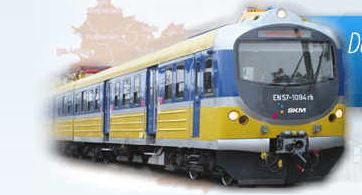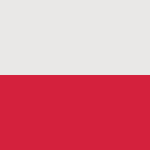Gdansk – practical information
Climate
Most of Poland has a continental climate, giving warmer summers and colder winters than in Denmark; Gdansk is though mainly affected by the Baltic Sea, which causes temperatures closer to what is normal in Southern Scandinavia. The pre-summer period can offer periods with a lot of rain, but the summers are usually sunny and quite warm. In July and August I can almost guarantee beach weather. Winters are obviously cold but very low minus temperatures are rare, and even the coldest month, January, is generally in the plus temperatures during the daytime.
Suburban train
The local SKM (Quick City Line) connecting Gdansk, Sopot and Gdynia is an outstanding construction in an agglomeration that is mainly long and not very broad. The suburban train starts at the Śródmieście Station (midtown) in Gdansk and stops every 1-2 kilometres until Gdynia. More or less every second or third train continues to the towns Rumia, Reda and Wejherowo. Line no. 2 starts in Wrzeszcz, continues to the airport and finishes in Gdynia.
It would be nice if the train ran more frequently during the weekend and in the evenings, but it’s bearable and it’s a perfect way of getting around town. Unfortunately the ticket system is independent from that of the buses and trams, but in most cases you wont need to change to other means of transport. For temporary tickets you will find cooperation between the different systems, see buses and trams.
On workdays from 5.30-21.00 the suburban train runs every 10 or 15 minutes, whereas they are much less frequent the rest of the time, and only one train runs between 1.00 and 4.30 in the morning. Saturdays and Sundays they normally run every half hour.
Tickets can be bought in kiosks and ticket offices, and you need to validate them in a small yellow machine before you enter the platform. It is also possible to buy tickets in slot machines: In emergency cases you may buy a one-way ticket at the train (only the first wagon).

Buses and trams
Public transport in 3-city is quite efficient but may be quite slow during peak hours.
Tickets for buses and trams may be bought in kiosks and slot machines at metro stations and major junctions.
Gdansk has a well-functioning network of trams within the city borders. 11 tramlines run alongside the town at some distance from the train line and in this way most of the city is covered with public transport, but the train is the quickest way to get around. Also some trams will run across the town to areas that are not covered by the other lines; In the direction of the coast they go to Stogi, Nowy Port and Brzezno, inside the country towards Siedlce and Chelm. All trams stop by the central station in Gdansk. Furthermore a broad network of buses run outside the main roads and also a few night buses.
Buses in Sopot are maintained by the bus companies of Gdansk as well as Gdynia. There exist a few local lines, but most of them continue to Gdansk or Gdynia.
Gdynia doesn`t have trams but the public transport is being managed by a close network of buses and trolleybuses.
Bikes
3-city is the best biking region in Poland, with biking paths stretching all along the coast and along the main junctions and most of them are well kept. The biking paths are normally only found on one side of the road ie: They are made for two-way traffic.
Cars do not show the same attention to bikes as they do in some Western European countries, and you should be careful when biking. Quite a few people ride on the pavement. Theoretically this is illegal for adults, but it is socially acceptable. It can be expensive though, if you ride into someone or something.
It is an offence and punishable by law to ride a bike after consuming alcohol and the ban is executed effectively. A malicious rumour has it that it is much easier for the police to catch drunken bikers than motorists, and that they simply try to catch the easiest in order to prove their efficiency.
Airport
The Lech Walesa Airport in Gdansk is an average sized, modern airport around 10 km from the centre of Gdansk, and a newly built express road from Wrzeszcz to the airport makes the trip fairly uncomplicated. The train from Wreszcz or Gdynia is quick and reliable.
Ferry connections
Polferries has regular connections to Nynashamn, very close to Stockholm.
Stenaline leaves from Gdynia for Karlskrona, from where there is a regular train and road connection to Copenhagen. It’s not the cheapest way to travel, but is gives a chance for a lovely voyage, and it is perfect if you carry a lot of baggage.
Car
Please notice that the city centre and the neighbouring areas in Gdansk, Sopot and Gdynia have parking meters and you need to buy a ticket Monday-Friday 08:00-18:00 (in Sopot you need to pay most of the time).
Automatic speed cameras have been installed all over town, and the Police often lie in wait at popular high-speed spots. In spite of this the average speed is well beyond the speed limit of 50 km per hour.
If you have a major repair it may be worthwhile having it done at a garage in 3-city.
Tips
There is no obligation to give tips anywhere in Poland (except a few restaurants, but it should be clear from the menu if they add a service charge). You may round up in the cab, but there is no reason whatsoever to add a percentage.
If you are seated at a table at a restaurant the waiter will expect a tip, but many people don’t give anything, and it is not mandatory. The wage is low though, and tips are important to the waiter, so it would be fair to leave a little extra. Personally I leave an additional 5%, if I am satisfied with the service. A few restaurants may add a service charge when receiving larger groups, but if they haven’t informed you beforehand I would personally consider this a reason not to give anything extra at all.
The maids at the hotel will be happy if you leave some small change when you leave, and a pageboy will expect 2-5 zloty to carry your suitcase to your room.
If you like to tip, then it will be appreciated anywhere. No one will probably feel insulted if you appreciate their work, but it is not expected.
Electricity supply
220 volt. The wall sockets fit standard continental European plugs.
Money and credit cards
Senior travellers to Poland will remember how they once exchanged their $ or D-mark into Polish monopoly-money with the cab driver, waiter or at a gate. This is now just a past memory.
Cash may best be exchanged in small, specialized shops (Kantor). It is wise to check the exchange rate in different places. In the airport, at the railway station and places where a lot of tourists gather together the difference between buy and sales rates may be up to 10%, whereas in most kantors it should only be a few percent. You will normally NOT pay a fee when exchanging money.
Almost all shops, hotels and restaurants in Warsaw accept international credit/debit cards (In some cases you may have to spend a minimum of 6 or 10 zloty if you want to pay by card), and wherever you find yourself there will be a cash dispenser where you can insert your card and receive Polish zloty.
Business hours
Local food shops are open from 6-7 a.m. till late evening. Most ordinary shops open at 9, 10 or 11 a.m. and close around 6.00 p.m. 18.00. Many shopping centres keep open till 9.00 or 10.00 p.m. Many shops close on Sundays, but shopping centres are only closed on 13 special yearly holidays, where it is mandatory to close.
Most cafes are open from early morning, most restaurants open at 11:00 or 12:00, but some of them close quite early.
Smoking
You are not allowed to smoke in airports, at railway stations, offices, hospitals and most indoor areas unless they are equipped with a smoking cabin.
Many restaurants have smoking departments, and you are allowed to smoke in your hotel room, unless it is explicitly forbidden.
Beer, wine and liquors
Beer and wine in supermarkets can be expensive compared to western European prices, but in general it is cheap to drink in bars and restaurants.
Remember that any kind of alcohol must be consumed at home or at bars/ restaurants. It is FORBIDDEN to drink in public on the street or in parks.
Water
The water from the local water supply is generally considered to be unfit for human consumption due to a nasty smell, bad taste and harmful substances. The last few years and a lot of money from the European Union is changing the picture though, and today the water from the tap should be drinkable in most parts of Gdansk, but few of the people I know drink it, unless it has been boiled. You may buy plastic bottles with water anywhere, and it will probably stay like this for a long time to come.
Please send an email to m@hardenfelt.pl if you would like an English-speaking tour guide to show you the most important places in Warsaw.
